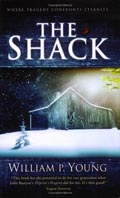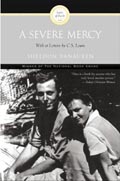 ‘The Shack’ by William P. Young has grabbed the attention of many Christians. Some are raving fans. Some are scathing critics.
‘The Shack’ by William P. Young has grabbed the attention of many Christians. Some are raving fans. Some are scathing critics.
Part of me sympathises with the fans. It’s a book that addresses the pain of loss that afflicts many of our lives. It’s a book that reminds us of the wonder of a God who is Trinity. It’s a book that has some moments of brilliance in helping us comprehend what it means that “God is love”.
The problem with ‘The Shack’, however, is what’s left unsaid. It’s strong on God’s love but weak on his holiness. Strong on Christ’s incarnation but weak on the cross. Strong on our pain but weak on our sin. Strong in seeking to defend God but weak in challenging us.
 I read ‘The Shack’ while our family was in Brisbane as Rossie commenced radiation treatment. Its strengths made it ‘a helpful read’ in that context, despite the obvious weaknesses. But then, as I read another book also addressing the theme of suffering, the weaknesses of ‘The Shack’ became all the more glaring by comparison.
I read ‘The Shack’ while our family was in Brisbane as Rossie commenced radiation treatment. Its strengths made it ‘a helpful read’ in that context, despite the obvious weaknesses. But then, as I read another book also addressing the theme of suffering, the weaknesses of ‘The Shack’ became all the more glaring by comparison.
This second book was ‘A Severe Mercy’ by Sheldon Vanauken. It’s hard to summarise this powerful, superbly written, autobiographical book (featuring wonderful correspondence between the author and C.S. Lewis). It chronicles Vanauken’s life and the loss of a loved one, and all God taught him through that. A Severe Mercy.
It’s hard to sum up the two different visions of God presented in these two books, and why the latter is so much more biblical in my view. But in a nutshell, I felt the god of ‘The Shack’ to be a comfortable god made in our image, while the God of ‘A Severe Mercy’ to be the confronting Biblical God in whose image we are made (and so the wonder of the cross all the more evidence of the depths of His love). The god of ‘The Shack’ revolves around us in a wholly individual experience. The God of ‘A Severe Mercy’ is He who we are to revolve around, in service of Him and others.
All that said in comparison of these two books, it is of course only the Bible that truly reveals God as he really is. We need to read it constantly so we’re ready to discern all else that we read.





Thanks for the book reviews Steve. I think we are all prone to try and shape a god to be a comfortable god that revolves around us. We are so fortunate to live this side of the cross when we can see what God is really like through reading the gospels about Jesus who said whoever sees him, see God the Father as well (John 14:9)
For me as I read The Shack it will be good to use this book to start my next bonfire. Its so not right for a book thats advertised as the “pilgrims progress” for this generation. For me its so far away from the journey John Bunyan was portraying in his story.
I see The Shack like what some churchs are doing only teaching the nice things and not being honest about the things that we hate to hear.
Thats my opinion what are others who have read this book.
I haven’t read “the shack” and so won’t comment on it, but I’m about halfway through “A Severe Mercy” and I have to say its a beauty – the story of a great love lost to death and the discovery of an even greater love, worth more than life itself (I hope I’m not giving too much away).
Steve, Vanauken himself makes an interesting observation about prevailing attitudes in society that I think goes a long way to explaining the fundamental difference you have observed between the two books: “…we both believed – again we took it for granted – that we could, of course, alter ourselves if we once saw good reason to do so: our minds and wills were in control. The statement, so sommon in these days of mass psychologising, ‘This is the way I am and you’ll just have to accept it’, would have been quite impossible for either of us. We may have been over-confident, but I can’t help feeling that our willingness to tackle anything was altogether preferable to the passive acceptance of known faults.’
Hey All, I have heard a lot about the shack, some good, a lot critical…I personally have not read it yet (its in my large pile of “to read’ books but my mum and best mate have. I whole hearted agree with Steve’s final comment regarding the Bible. ANY book we read in addition to the bible shall be discerned by the Bible and the Holy spirit illuminating the scriptures.
I am almost finished the Shack and must say that while I agree with the theological weaknesses expressed by Steve I have some positive things to say. My reaction to the book would depend on who is reading it and why. Biblically based mature Christians should be able to take from the book what is helpful for their Christian walk and think through or discuss with others how the bible answers the bits that are off track.
I am finding the images of the Trinity helpful in my mediation on God and His work in my life. I love how the book shows God’s intimate concern for the main character and His endless patience with Him. I love that it looks like God has nothing else to do but listen to and minister to the main character.
I wouldn’t give this book to a new Christian or seeker and I did find the suffering he endured before coming before God to be disturbing (read the back to check if you can handle it). If you do read it why not discuss with a friend what parts are helpful and where the bible might answer differently.
I think the books’ popularity shows that one of our top questions next term should be something like “why does God allow suffering?”.
I haven’t read either of the books, but I do agree with Katja’s final comment about one of our ‘Got Questions’ being something to do with why God allows suffering. From all the conversations I’ve had with the girls at my work (in regard to the ‘Got Questions’ series and prior to that), this seems to be a very common question and source of confusion (though one of the girls did make the comment of “if they’d just left the apple alone, everything would still be perfect…” so some understanding is there…).
I’ve noticed the same thing at uni- the big questions seem to be about suffering and injustice, and the purpose of life … which are really related questions: experiencing suffering makes us ask WHY?
yes I think that we can lock in that the suffering question will finish very high on the top ten list, if not at the top. Any thoughts from anyone on the ORDER of how we might tackle the 10 questions… e.g. go from 10 to 1? 1 to 10? mix them up? … perhaps 10 to 1 builds the momentum best??
Are the questions the 10 most popular, or the 10 most likely to be running through most people’s brains (but they may not have had the guts to ask them)?